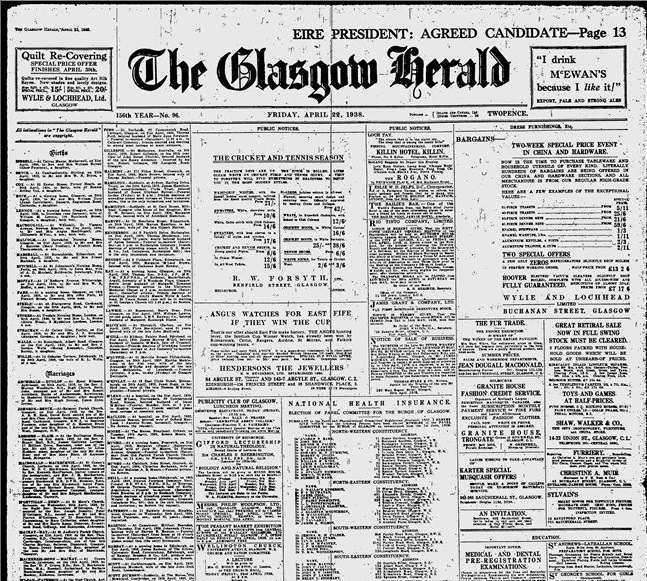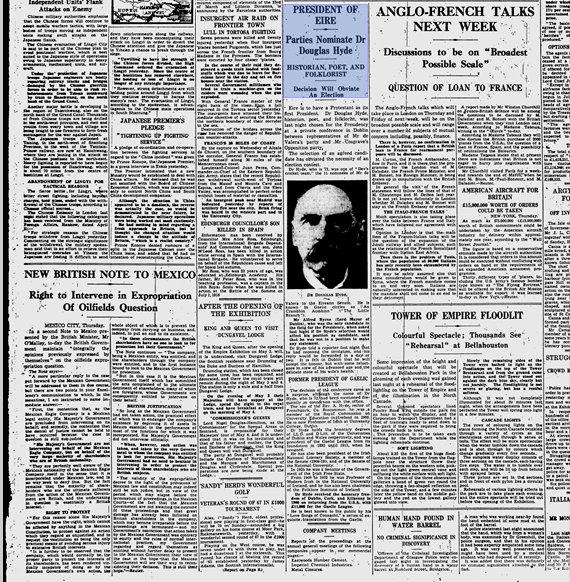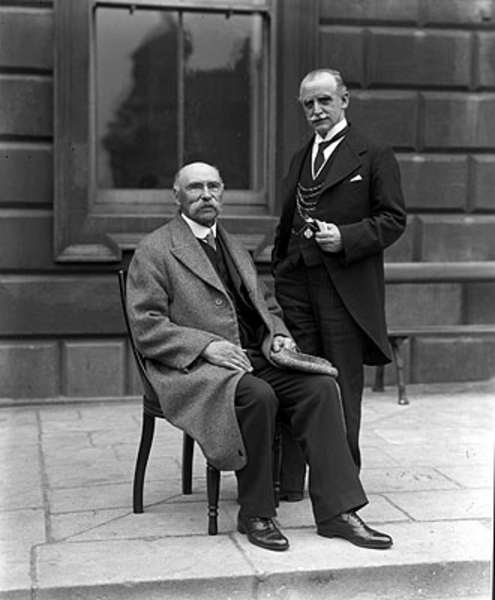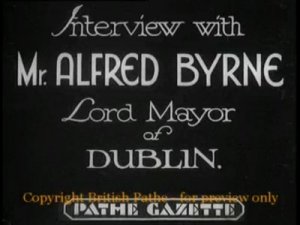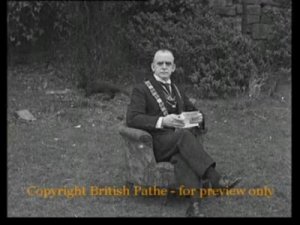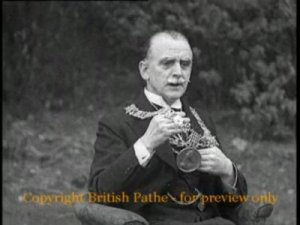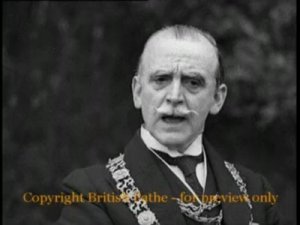|
Alfred Byrne (1882-1956): Lord Mayor of Dublin
and Mayor of Beaugency in Joyce’s children’s story
In “the cat of Beaugency” - the tale told in a letter to his grandson Stephen dated 10 August 1936 and widely published as The Cat and the Devil (1964 & edns.), James Joyce calls the mayor who manages to outwit the Devil ‘Alfred Byrne’. The following notes have been compiled in preparation for an afterword to a Brazilian translation of that story as The Cat of Beaugency (Brazil: EDUFRN 2013).
Note: There is a new biography of Alfred Byrne by Trevor White, The Life and Times of Alfred Byrne (Penguin Ireland 2017) [Sept. 2017].
Lectures on Byrne by White and David McEllin at the Little Museum are also available on YouTube; see Little Museum - online; accessed 07.10.2017 [Also Trevor White on Byrne - YouTube online.; David McEllin on Byrne - YouTube online. Note that neither of these reference James Joyce. ]
[Note - the text of a Pathé Gazette interview with Byrne as given below is copied from the British Pathé website - online; accessed 14.04.2013]
[ top ]
| Allusions to Alfred Byrne in Finnegans Wake: |
Thisafter, swift’s mightmace deposing, he shall aidress to His Serenemost by a speechreading from his miniated vellum, alfi byrni [568.32] gamman dealter etcera zezera eacla treacla youghta kaptor lomdom noo, who meaningwhile that who meaningwhile that illuminatured one, Papyroy of Pepinregn,my Sire, great, big King,
(his scaffold is there set up, as to edify, by Rex Ingram, [568.35.] See also, ‘chokefully chewing his chain’ [494.36] and ‘necknoose aureal’ (FW568.20),
|
| |
|
Remarks on James Joyce & Alfred Byrne
|
There are no allusions to Byrne in Richard Ellmann’s James Joyce (1959) for the very good reason that Joyce had no personal contact with him. Nor does his anomalous appearance in “The Cat and the Devil” receive a footnote in the Letters of James Joyce where that tale was first printed as part of the original letter to Stephen of August 1936 (Letters, 1957, pp.386-87.) The sole allusion to Byrne in the correspondence occurs in a letter to Giorgio - then in New York - on 19 February 1935 when Joyce writes from 7 rue Edmond Valentin, Paris 7ième: |
[...] I see the little Lord Mayor of Dublin Alfie Byrne is going to N.Y. for the 17th. Every day I open the Irish Times I see him and his golden chain in some photograph or other. He has been Lord Mayor for 7 years but before him Mr. “Larry” O’Neill was Lord Mayor for 15 years. In my time the Lord Mayor was elected by members of the corporation to whom he owed money so that they could get a garnishee order on his salary.
Oh yes I remember now. You said you had a film taken, isn’t that it and if I would like it. Yes, by all means.
|
—Letter to Giorgio, 19 February 1935, in Letters, III (NY: Viking Press 1996), p.346.
|
| This hardly sounds like a respectful tribute. (Joyce ends the same letter, rather touchingly, ‘Graditi, cari pargoli, I sensi dei miei più doverosi ossequi.’ p.386 - i.e., ‘accept, little ones, my dutiful homage’.) |
|
Note that Glasheen lists Alfie Byrne as a friend of JSJ obviously mistaking him for Alfred Bergan. (3rd Census, California UP 1977, p.47.)
|
|
There is an “Irishman’s Diary” by Frank McNally on Alfred Byrne - at The Irish Times (6 June 2015) - online [accessed 17.10.2017].
|
| |
| The real Alfred Byrne, a working-class politician who served as the ten times Lord Mayor of Dublin, was born on St. Patrick’s Day in 1882 - the year of Joyce’s birth - the son of an docker who died in his thirteenth year. In the working world he first sold theatre programmes, worked in a bicycle shop on College Green, then became a barman and later bought the Vernon Pub in Talbot St., Dublin. In 1909 he entered politics and won the Dublin Corporation seat for the North Dock at the age of 27. In 1914 he became an Alderman of the City of Dublin. In 1915 he was elected MP for Dublin Harbour on behalf of the Irish Parliamentary Party 1915, which promoted Home Rule. In 1918 he was defeated by Philip Shananan of Sinn Féin in a landslide victory for that party. Later, however, he gained the support of Tim Healy, the leader of the Irish Parliamentary Party, for Shanahan (who was also a publican) when the British military attempted to terminate his licence following his - Shanahan’s - participation in the 1916 Rising. Healy succeeded in defending his property, a transaction that is mentioned in his memoirs. In 1922, Byrne was elected to the 3rd Dáil [Parliament] as an independent candidate for mid-Dublin and during 1923-28 he held a Dáil seat for Dublin North. As a politician his popularity rested on his concern for the working man. In 1928 he was elected to the Seanad [Senate] but returned to the Dail in 1932 and represented Dublin North during 1932-37 before moving to the sesat in Dublin North-East during 1937-56. In 1930 he was elected Lord Mayor of Dublin and held that post continuously for nine years. In 1938 he was seen as the only candidate for the Presidency of Ireland other than Douglas Hyde, who took the post by common agreement between the parties. (See The Glasgow Herald - infra.) According to Wikipedia, he failed to get the necessary 20 nominations from the Oireachtas [Irish Presidential Election 1938 - online]. He subsequently resumed that annually-elected post in 1954 but lost the election in 1955; in the same week he received a Hon. Doctorate in Law from TCD. He died of cancer of oesphagus and pneumonia. His Dáil seat was then taken by a son. A huge public funeral was accorded him at his death and his extensive collection of papers and memorabilia was exhibited in The Little Museum, Dublin, in 2015. [BS] |
| |
See extensive remarks on Joyce’s allusions to Byrne in Finnegans Wake in Janet E. Lewis, ‘The Cat and the Devil and Finnegans Wake’, in James Joyce Quarterly, Vol. 29, No. 4 (Summer, 1992), pp.805-14 - notes as attached. Lewis quotes letter to Giorgio and Helen Joyce [as above]. See her remark on the phrase ‘alfi byrni’ in Finnegans Wake [as above] ‘Joyce adds both these insertions to Galley 236 of Work in Progress, dated by David Hayman following the printer’s note, 24 April 1937.’
|
[ top ]
|
Transcript of Pathé Gazette Interview with Alfred Byrne
|
| In 1936 Alfred Byrne was interviewed in an armchair on a lawn - presumably his own - in a suit, and with his chain of office. In that little film of 5.56 mins. entitled “Interview with Mr. Alfred Byrne, Lord Mayor of Dublin”, he speaks in a working-class accent voice marked by such variants as ‘ev-er-y body’ for ‘ev’rybody’, ‘reely’ for ‘really’, ‘gener[d]ally’ ‘generally’, and ‘souther[d]n’ for ‘southern’, and pronounces ‘unemployed’ more nearly as ‘unimplied’. The tape is 5.56 mins. long - as follows: |
‘Ladies and Gentlemen, I am privileged today owing to the kindness of courtesy of Mssrs. Pathe Gazette to address a few words to you. Frequently I have crossed the water as well as being across the border to Northern Ireland and when I went to England I have been asked many times what is the matter with Ireland? I have just been reminded that this is the sixth year of the mayoralty of the city of Dublin and this chain that you see is the same chain worn by Daniel O’Connell in 1847 and because I am Lord Mayor of Dublin a very large number of people think that I can tell them what is the matter with Ireland. But let me assure everybody in this house and all my friends who are listening that there are no animosities between - at any rate no serious animosities between - the Irish and the British people. Neither are there any great animosities between out people in southern and in northern Ireland I am hopeful that the day is not far distant when they can be got together to work as one man for the prosperity of the whole country and its people. However let me remind you of the position as I see it, I cannot imagine prosperity coming to this country until by agreement that festering sore that is really a danger to our country as well as to England - I refer to the removal of the border between North and Southern Ireland. If we can get that border removed by consent and if our people as I said before will settle down, I am satisfied it will be to the benefit of England as well as to our people in Ireland. It will be to our benefit because I think our politicians, our leaders of people, our public speakers, who to my mind are doing much harm by abusing one another, by using language on the platforms that’s not a credit to our country. You’ve often heard it yourselves, that if you chance to differ with a man who is aiming as you are aiming for the freedom of this country and for its betterment, if you do not agree with him, he shouts out the word “Traitor”. Now, I think we have had too much of that language and calling names and giving abuse to one another will not bring prosperity or will not help our unemployed people. It should be all our aim to bring friendship between the peoples of Great Britain and Ireland and then avail to the full of the market that can be offered and when that day comes all the young men in Ireland who have left the land to go to towns and cities, they may be in a position to go back to the land and be provided with a decent means of living that you and I and all the people earnestly desired them to have. Now, if we hated each other a little less than what we do today, and if we did not exaggerate our admiration of those whom we agree with, and if we had a little less condemnation of our friends as well as our opponents I think it would be to the advantage of the whole country. This little country of ours cannot continue to keep two parliaments with two big sets of officials going, and if I can be of the slightest service now or at any time in bringing people together that will (bring) remove that that border it will be the one ambition of my life and as I said already to you, I hope the day is not far distant when they will get together and think of the unemployed and think of the future of the country regardless of what it means to themselves and their public positions.’ [End.]
|
See Pathe Gazette - online;; transcription mine - BS>. |
[ top ]
|
Images of Alfred Byrne Interview with Pathe Gazette
|
[ top ]
| See also ... |
Glasgow Herald (22 April 1938)
Report on Selection of Douglas Hyde for President. |
President of
Eire
-
Parties Nominate Dr.
Douglas Hyde
-
Historian, Poet, and
Folklorist
-
Decision Will Obviate
An Election |
| |
Eire is to have a Protestant as its first President. Dr. Douglas Hyde, historian, poet, and folklorist, was last night chosen for the Presidency at a private conference in Dublin between representatives of Mr de Valera’s and Mr Cosgrave’s Opposition party.
The selection of an agreed candidate has obviated the necessity of election contest.
Dr Douglas Hyde, who is 73, was one of “Dev’s cricket team”, the 11 nominees of Mr de Valera to the Eireann Senate. He is known in Gaelic circles as “An Craoibhin Aoibhinn” (“The Little Branch”).
[Insert in bold:] Mr Alfred Byrne (Lord Mayor of Dublin) who was the only candidate in the field for the Presidency, when asked last night if Dr. Hyde’s selection would affect his position as candidate, said that he was not in a position to make any statement.
Dr Hyde told a reporter last night that he had received the invitation, and his reply would be forwarded in a day or two. It is felt in Dublin that he will accept the honour, but with some reluctance in view of his advanced age and the delicate state of his wife’s health.
[A biography of Dr Hyde follows.]
|
| Available at Google Newspapers - p.1; 15.04.2013. |
| |
|
|
